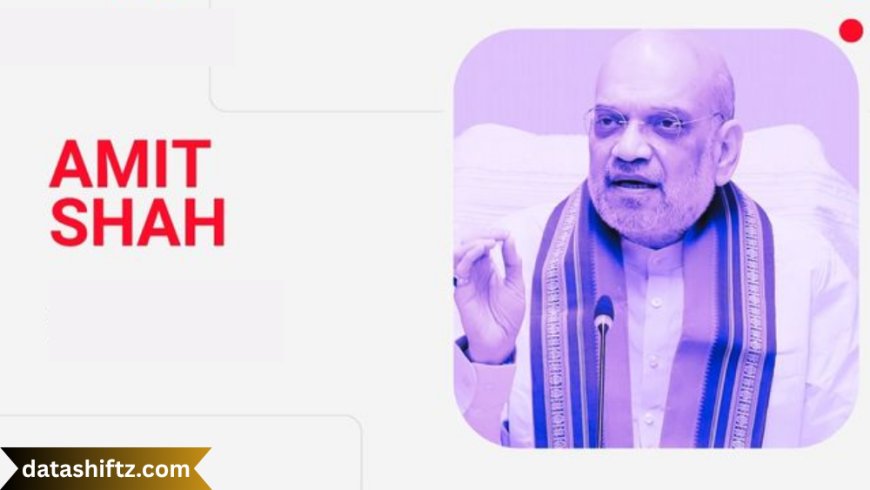Amit Shah: The Architect of India’s Modern Political Strategy

Introduction
Amit Shah, one of the most influential political figures in contemporary India, has played a pivotal role in reshaping the country's political landscape over the past decade. Known for his strategic acumen, organizational skills, and ideological clarity, Amit Anilchandra Shah is not just a prominent leader of the Bharatiya Janata Party (BJP), but also one of the central figures behind the party’s meteoric rise across Indian states.
Currently serving as the Union Minister of Home Affairs and a key confidant of Prime Minister Narendra Modi, Shah has transitioned from a grassroots political worker to the mastermind of national electoral victories. From Gujarat politics to handling national security, his influence spans across governance, legislation, and political mobilization.
In this comprehensive article, we explore Amit Shah’s journey, his achievements, controversies, leadership style, and his lasting impact on Indian politics.
Early Life and Political Beginnings
Born on October 22, 1964, in Mumbai, Amit Shah hails from a Gujarati Hindu Baniya family with business roots. He was raised in Mehsana, Gujarat, and pursued a degree in Biochemistry from CU Shah Science College, Ahmedabad.
Political Entry through RSS and ABVP
-
Shah was first drawn to politics through the Rashtriya Swayamsevak Sangh (RSS).
-
He soon joined the Akhil Bharatiya Vidyarthi Parishad (ABVP) and later became a member of the BJP’s youth wing.
It was during this period that he came into contact with Narendra Modi, forming a partnership that would later define modern Indian politics.
Rise Through Gujarat Politics
Amit Shah began his formal political career in 1995 when he became an MLA from Sarkhej constituency in Gujarat. He held that seat until 2007 and won again from Naranpura in 2012.
Key Roles in Gujarat:
-
Home Minister of Gujarat (2002–2010): Served under Chief Minister Narendra Modi.
-
Handled crucial portfolios such as Law and Justice, Home Affairs, and Border Security.
-
Known for his administrative efficiency during the 2002 Gujarat riots — although later embroiled in controversies.
His grassroots organizational skills and data-driven election management made him an indispensable strategist within the BJP.
BJP President and National Political Expansion (2014–2020)
After Narendra Modi became Prime Minister in 2014, Amit Shah was appointed BJP’s National President in July 2014. His leadership marked a new era in Indian politics defined by aggressive campaigning, cadre-based mobilization, and expansion in non-traditional territories.
Major State Elections Won Under Amit Shah’s Leadership
| State | Year | BJP's Performance |
|---|---|---|
| Uttar Pradesh | 2017 | 312/403 seats (historic victory) |
| Haryana | 2014 | 47/90 seats (first majority ever) |
| Maharashtra | 2014 | 122/288 seats |
| Assam | 2016 | 60/126 seats (first government in NE) |
| Jharkhand | 2014 | 37/81 seats |
| Tripura | 2018 | 36/60 seats (ended 25-year Left rule) |
Union Minister of Home Affairs – Key Policies and Reforms
In 2019, after BJP's massive re-election victory, Amit Shah was appointed as the Minister of Home Affairs. His tenure has been marked by several bold and historic decisions.
Key Initiatives and Policies as Home Minister
-
Abrogation of Article 370 (2019)
-
Removed Jammu & Kashmir’s special status
-
Bifurcated the state into Jammu & Kashmir and Ladakh union territories
-
-
Citizenship Amendment Act (CAA, 2019)
-
Provided a path to citizenship for non-Muslim refugees from Pakistan, Bangladesh, and Afghanistan
-
Triggered widespread national protests
-
-
NRC and NPR Proposals
-
Proposed nationwide National Register of Citizens (NRC)
-
Linked with concerns over citizenship and identity
-
-
Improved Internal Security Measures
-
Strengthened anti-terror operations
-
Increased intelligence and border monitoring
-
-
Crackdown on Left-Wing Extremism
-
Targeted Naxalite strongholds with development and security interventions
-
Leadership Style and Political Strategy
Amit Shah is widely recognized for his micromanagement, strategic booth-level planning, and data-driven decision-making.
Features of Shah’s Leadership
-
Cadre-Based Mobilization: Reinvigorated BJP’s grassroots machinery with structured organization.
-
Use of Technology: Integrated social media and digital outreach in election campaigns.
-
Narrative Building: Strong emphasis on nationalism, development, and cultural identity.
-
Alliance Management: Negotiated with allies and expanded NDA’s footprint.
-
Centralized Strategy: High command culture emphasizing discipline and accountability.
Controversies and Criticism
Amit Shah’s career has not been without controversy. His bold and often polarizing decisions have drawn both praise and protest.
Notable Controversies
-
Sohrabuddin Encounter Case
-
Accused and later acquitted in the alleged fake encounter case.
-
-
Article 370 Abrogation
-
Seen by critics as unconstitutional and undemocratic.
-
-
CAA-NRC Protests
-
Widespread protests from minorities and civil society.
-
-
Authoritarian Leadership Allegations
-
Accused of centralizing power within the party and government.
-
-
Electoral Polarization
-
Critics argue that some campaign speeches have inflamed communal tensions.
-
Amit Shah’s Vision for India
Beyond elections and administration, Amit Shah has expressed a vision for a strong, secure, and culturally rooted India. His priorities include:
-
One Nation, One Constitution
-
Digital Governance
-
Rural Development
-
Cultural Nationalism
-
National Security as a Priority
He envisions a self-reliant India (Atmanirbhar Bharat) driven by economic growth, national pride, and efficient governance.
Amit Shah’s Roles and Tenure Overview
| Position Held | Tenure | Key Achievements |
|---|---|---|
| BJP National President | 2014–2020 | Massive electoral expansion |
| Member of Parliament (Rajya Sabha) | 2017–Present | Policy-making, national debates |
| Union Home Minister | 2019–Present | Article 370, CAA, internal security reforms |
| MLA, Gujarat Legislative Assembly | 1997–2017 | Development-focused legislator |
| Chairman, National Democratic Alliance (NDA) | 2023–Present | Strengthening alliance with regional partners |
Awards, Recognition & Public Perception
-
Mastermind Behind BJP's 2014 and 2019 Victories
-
Recognized Globally for Electoral Strategy
-
Viewed as Second Most Powerful Person in Indian Politics
-
Featured in Top Global Political Strategists Lists
-
Respected as a Pragmatic Yet Ideological Leader
Conclusion
Amit Shah’s journey from a young activist in Gujarat to India’s Home Minister and a national strategist is a testament to his political genius, organizational capability, and unwavering commitment to ideology. While admired by his followers for decisive leadership and nationalism, he remains a controversial figure for others due to his bold political maneuvers.
Whether one supports or critiques him, Amit Shah’s role in defining 21st-century Indian politics is undeniable. As India continues to navigate complex socio-political challenges, his influence is likely to shape both governance and electoral narratives for years to come.





























